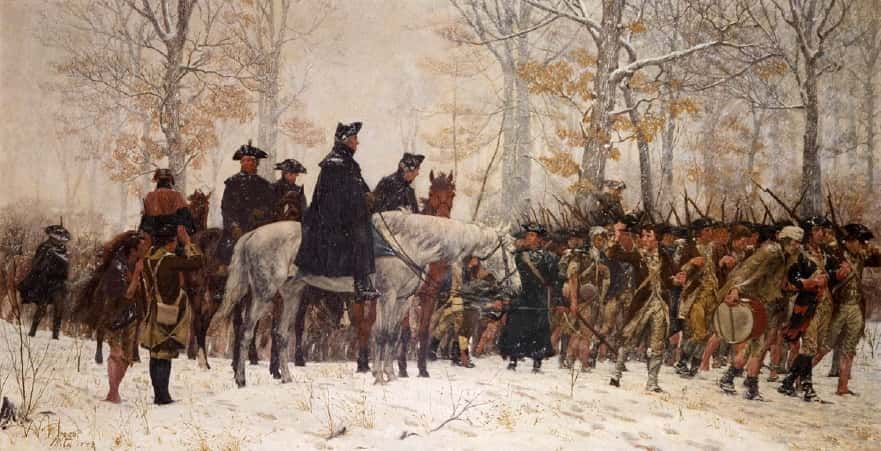American Revolutionary War Hero Joseph Lovett Has Ties to Marshall County
Written by Justin D. Lamb

The March to Valley Forge. Joseph Lovett, ancestor to the Lovett family in Marshall County, was among the men who endured the bitter winter at Valley Forge in 1777.
Most every Lovett in western Kentucky can trace their lineage back to Revolutionary War hero, Joseph Lovett, who first came to America in the 1770s. Born in 1756 to Daniel Lovett and Sarah Biles Lovett in England, 19-year old Joseph Lovett came to America via Portugal on December 7, 1773 aboard the ship Clementia as an indentured servant to the Batso Furnace, an iron foundry in New Jersey.
During this time, American colonists were growing restless with the British Crown and the calls for American independence were growing louder. Several protests including the famed Boston Tea Party were happening all across the American colonies. In response, the British government passed punitive laws against the colonists. Tensions finally reached a boiling point in April 1775 with American Patriot Militias and British forces meeting in battle at Lexington and Concord in Massachusetts. On June 14, 1775, the Second Continental Congress established the Continental Army for the purpose of common defense of the colonists against the British.
With the calls for revolution in the air and unsatisfied with his lot in life, Joseph Lovett escaped his servitude at Batso Furnace and joined the militia at New York which was later attached to the Continental Army now under command of General George Washington.
Joseph Lovett fought in the Battle of Long Island in August 1776 with General Washington, and after his militia was forced to retreat, he spent the winter with Washington and his troops and was among those who crossed the Delaware on Christmas Eve 1776.
By June of 1777, Joseph Lovett enlisted in the Continental Army at Baltimore, Maryland for a term of three years and became a member of Colonel Nathaniel Gist’s famed “Rangers”. The company fought in the battles of Brandywine and Germantown and spent the harsh winter at Valley Forge.
After surviving the cold bitter winter at Valley Forge, Joseph Lovett fought at the Battle of Monmouth where he was wounded after he received buckshot in the hip which he carried for the rest of his life. By September 1778, Joseph Lovett’s wounds were healed and he and his company were on the march south to fight the British. Joseph Lovett fought in the Battle of Charleston in South Carolina and was wounded and taken prisoner when General Benjamin Lincoln surrendered to the British. Most of the nearly 4000 American troops were captured.
Joseph Lovett eventually escaped British capture sometime around June or August of 1780 and fled to Guilford County, North Carolina where he joined the local militia to continue the fight for American independence. He volunteered and fought at the Battle of Camden, South Carolina in August 1780 under General Horatio Gates. After only one hour of combat, the American forced suffered a debilitating defeat with over 2,000 casualties.
The following year in March 1781, Joseph Lovett fought in the Battle of Guilford Court House in North Carolina where a British force of 2,100 under the command of Lieutenant General Charles Cornwallis defeated General Nathanael Greene‘s 4,500 Americans. However, the British victory was hollow as it sustained such heavy casualties in a result that was considered a strategic victory for the Americans which some experts believe helped lead to end of the war a few months later. Due in large part to the Franco-American cooperation, the British finally surrendered following the Siege of Yorktown in October 1781.
Following the end of the war, Lovett became a farmer and made Guilford County, North Carolina his home. He married Sarah Hodgson in 1782 and the couple had eight children together: Mary (Lovett) Davis, Aaron Lovett, Moses Lovett Sr., Comfort (Lovett) Armfield, Elizabeth Lovett, John Lovett, Joseph Lovett Jr. and George Lovett.
Joseph Lovett passed away on May 12, 1833 at his home in Guilford County, North Carolina. Both Joseph and his wife Sarah are buried in New Garden Cemetery, Friends Burial Ground, New Garden Road in Guilford County, North Carolina.
Attracted by cheap land prices, Joseph Lovett’s grandsons Daniel, Robert, George W. William F., and John L., became the first Lovetts to arrive in western Kentucky when they made the journey from North Carolina through Tennessee into the Purchase region eventually settling along the Tennessee River in the Unity and Olive communities in what would become Marshall County in 1842. Their descendants including the author of this article still call Marshall County home today.
- Scott, Kenneth “Runaways, Excerpts from the Pennsylvania Gazette 1775-1783.”
- National Geographic Society Quarterly Vol 64:4 (Dec 1976) pp. 243-260. Page 248. Source publication code: 8242
- Revolutionary War Pension & Bounty Land Warrant Application (NARA Pub M804 File# 972106)
- Fold3.com
- Marriage record– North Carolina Marriage Book 1741-1868
- National Archives: Publication Title: Index to Selected Final Payment Vouchers, 1818-1864
- National Archives Catalog ID: 2733385 Record Group Number: 217
- Census Records
- www.jonesgenealogy.org
